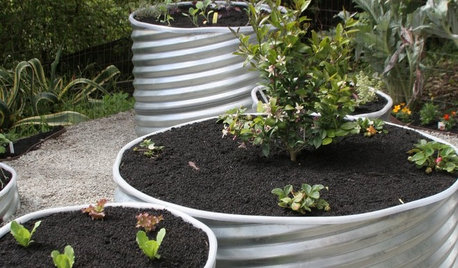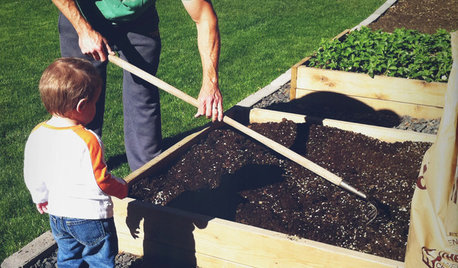Raised bed soil and horse manure
qhound
14 years ago
Related Stories

GARDENING GUIDESThe Poop Scoop: Enrich Your Soil With Good Old Manure
Get over the ick factor already — this natural super-ingredient for soil has so many benefits, you'll wonder why you ever went chemical
Full Story
GARDENING GUIDESGardening Solutions for Heavy Clay Soils
What’s a gardener to do with soil that’s easily compacted and has poor drainage? Find out here
Full Story
GARDENING GUIDESGrow a Beautiful Garden in Alkaline Soil
Got alkaline soil? Learn how to manage it and the many beautiful plants that will thrive in this ‘sweet’ soil
Full Story
GARDENING GUIDES8 Materials for Raised Garden Beds
Get the dirt on classic and new options for raised vegetable and plant beds, to get the most from your year-round garden
Full Story
FARM YOUR YARDHow to Get Good Soil for Your Edible Garden
The nutrients in your soil feed the plants that feed you. Here are tips on getting it right — just in time for planting season
Full Story
GARDENING GUIDESHouzz TV: Make a Worm Bin for Rich Soil and Happy Plants
A worm-powered compost bin that can fit under a sink turns food scraps into a powerful amendment for your garden. Here’s how to make one
Full Story
GARDENING GUIDESHow to Stop Worrying and Start Loving Clay Soil
Clay has many more benefits than you might imagine
Full Story
GARDENING GUIDESGet the Dirt on Your Garden’s Soil
Understand how your soil supports your plants so you can ensure your garden’s success
Full Story
GARDENING AND LANDSCAPINGBuild a Raised Bed to Elevate Your Garden
A bounty of homegrown vegetables is easier than you think with a DIY raised garden bed to house just the right mix of soils
Full Story
FARM YOUR YARDHow to Build a Raised Bed for Your Veggies and Plants
Whether you’re farming your parking strip or beautifying your backyard, a planting box you make yourself can come in mighty handy
Full StoryMore Discussions






docgipe
dchall_san_antonio
Related Professionals
Allen Landscape Architects & Landscape Designers · Comstock Park Landscape Architects & Landscape Designers · Baltimore Landscape Architects & Landscape Designers · North New Hyde Park Landscape Architects & Landscape Designers · Bainbridge Island Landscape Contractors · Cockeysville Landscape Contractors · Huntington Landscape Contractors · Kerman Landscape Contractors · Medford Landscape Contractors · Commerce City Decks, Patios & Outdoor Enclosures · Franconia Decks, Patios & Outdoor Enclosures · New York City Decks, Patios & Outdoor Enclosures · San Antonio Decks, Patios & Outdoor Enclosures · Verona Decks, Patios & Outdoor Enclosures · Westminster Decks, Patios & Outdoor EnclosuresqhoundOriginal Author
borderbarb
qhoundOriginal Author
curt_grow
qhoundOriginal Author
docgipe
qhoundOriginal Author
docgipe
qhoundOriginal Author